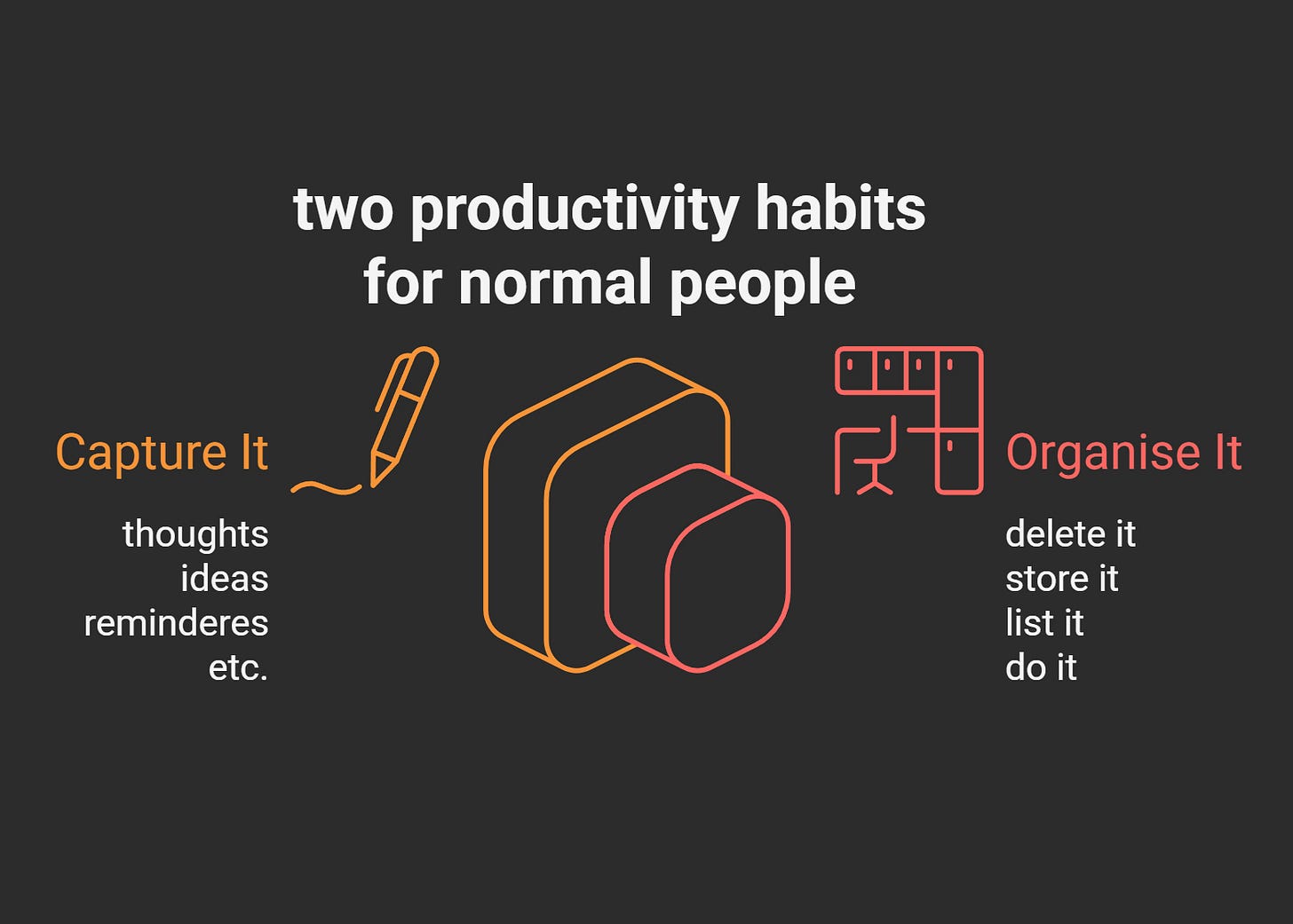Productivity for Normal People
Beyond GTD and Other Elaborate Systems
Around ten years ago, I used to self-medicate with productivity knowledge, and for a time, Getting Things Done was my favourite substance.
I was convinced that were I to find the optimal way of applying GTD, I would turn into a productivity god. I even made two videos on using GTD with Wunderlist and Evernote.
Then… life happened.
Trying to escape my existential angst, I ran interstate, then overseas, then back to my city. I changed careers, went back to uni, then back to the workplace I had left when I had started my escapade. I tried mastering sales and marketing, then residential real estate, then I realised that accounting was my type of work; for the most part.
Today, as a normal office worker, my productivity system is mostly these two simple habits that survive real life. I even have a mantra for it: “out of my head and into a place I can easily find, when I need it”.
The two simple productivity habits are:
1. Capture It
2. Organise It
Before I go through these two productivity habits, let's ensure we agree on the following:
No level of productivity knowledge or system mastery can assign meaning to your life or address underlying psychological problems like anxiety, ADHD, etc.
Operating with understanding and from an applicable system of productivity should however help you do what you need to do, with a bit more ease and within reasonable time slots.
Capture It
Your brain wasn't designed to be a filing cabinet. When you try to use your head as storage, you end up with that low-level anxiety that something important is slipping through the cracks.
That’s why the solution always is to get it out of your head and into a place where you can actually find it later.
Whether it's that dentis appointment, that business idea you wanted to discuss with Chris, or random articles you want to read, they all need somewhere to live that isn't your mental RAM.
The capture tool doesn’t quite matter as long as it is always with you and frictionless to use. After years of trying every productivity app under the sun, I landed on Apple Reminders because I can just tell Siri "remind me to xyz" and it's captured instantly.
Also, one or two capture tools is all you need. The more places you scatter your thoughts, the less likely you are to actually use any of them consistently and the harder the second habit becomes.
Organise It
This is where most productivity systems become their own worst enemy. If organising takes more energy than the actual work, you'll abandon the system within weeks.
You want to glance at your captured items and easily decide what you are to do about it by choosing one of these three options:
Delete it. Most things you capture don't deserve permanent residence in your life. That brilliant business idea from Tuesday? Probably not so brilliant on Thursday. Delete freely and without guilt.
Store it as reference. Useful articles, templates, reference materials, contact details are worth holding on to. These go into a simple filing system where you can actually find them again. I rename these files starting with a date formated as YYYYMMDD and a few key words that reflect how I’d think about this file if I had saved it a couple of years ago.
List it as something to be done. The remainder becomes actual tasks, written as actions you can take. Not "dentist" but "call dentist to book cleaning." Not "Chris meeting" but "email Chris about the business idea."
I keep two simple lists: what I'm focusing on today (maximum three things), and everything else I intend to do soon. That's it. If something has a specific date or time attached, it goes in my calendar. Otherwise, it lives in one of these two places.
The magic happens in the weekly cleanup. Twenty minutes on Sunday evening, I go through everything I've captured that week. Most gets deleted. Some gets filed. The few remaining items become clear, actionable tasks.
As you can see, this is far from a perfect system (whatever that is). Applying these two productivity habits will however provide enough organisation that you can trust what you've captured and actually use it when you need to.
That's it. Two habits that survive job changes, life chaos, and the inevitable moments when you realise you've been overthinking everything again.
If this resonates, I'd love to hear from you. What productivity trap have you fallen into? What actually works in your real life?
Until next time,
Vani


